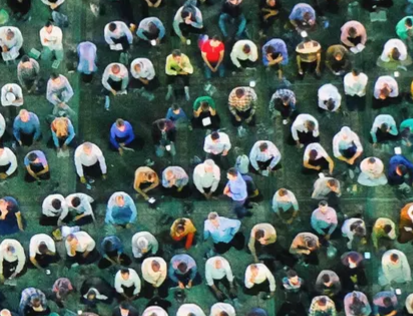As the lockdown commenced, I found myself cueing up other songs that reminded me of crowds.
當禁閉開始時,我發(fā)現(xiàn)自己開始尋找其他讓我想起人群的歌曲。
In the way a single snatch of melody can instantly remind you of an ex, or an old friend,
像一段旋律就能立刻讓你想起前男友或老朋友一樣,
I wanted songs that reminded me of what it's like to be with thousands of strangers.
我想要那些能讓我想起和成千上萬個陌生人在一起的感覺的歌。
I listened to Drake's Nice for What and Koffee's Toast, which took me back to swaying tipsily in the crush of Notting Hill carnival,
我聽了德雷克的“Nice for What”和科菲的“Toast”,這讓我回到了擁擠的諾丁山狂歡節(jié),
of being giddily overwhelmed, as the juddering sub-bass moved in waves through a million ribcages.
在劇烈震動的低音在數(shù)萬人的胸腔中回響時,淹沒在眼花繚亂的人海中。
I missed the disinhibition of dancing in a dark, low-ceilinged club.
我想念在昏暗、天花板低矮的俱樂部里跳舞的那種釋放。
I missed screaming into the cold winter air of the AFC Wimbledon terraces about an outrageous refereeing decision.
我想念在溫布爾登網(wǎng)球聯(lián)合會看臺上,在一個令人發(fā)指的裁判判罰后,對著寒冷的冬季空氣尖叫。
I missed the joy of chanting and feeling my own thin voice being made whole by others joining it in unison.
我想念吟頌的喜悅,也想念感受自己單薄的聲音因與其他人一起合唱而變得完整的感覺。
I missed the tingling mixture of anxiety and vertigo of the moment you first step out into a festival or football or carnival or protest crowd,
我也懷念,當你第一次參加一個節(jié)日、足球賽、狂歡節(jié)或抗議人群時,那種焦慮和眩暈交織的感覺。
a feeling of over-stimulation, the ripples of noise and colour jostling for your attention,
那是一種過度刺激的感覺,噪音和色彩的漣漪競相吸引你的注意力,
the anticipation of being subsumed in the crowd and yet powered up by it – of losing a part of yourself, and your independence, and being glad to.
期望被人群包圍,卻又為它所激勵——失去你自己的一部分,失去你的獨立,并為此感到高興。
I missed the strange alchemy of congregation, when your brain pulses with the validation of being with so many people who have chosen the same path.
我也想念,當你的大腦因與眾多選擇同一條道路的人在一起而悸動時,那種奇怪的教堂會眾般的魔力。
How could I be wrong? Look, all these people are here, too.
我怎么會錯呢?看吧,這些人也在這里。
While many of us were missing crowds, the realities of Covid-19 meant they had taken on a completely new meaning.
雖然我們中許多人都在想念人群,但新冠病毒的現(xiàn)實意味著他們具有了一種全新的意義。

Gathering with others was suddenly, paradoxically antisocial:
與他人聚在一起突然變得矛盾地反社會:
it suggested you were careless about viral transmission of a deadly disease,
這意味著你不關(guān)心一種致死疾病的病毒傳播,
more interested in your own short-term social needs than the lives of strangers.
相比于陌生人的生命,你更在意自己短期的社交需求。
The very sight of a crowd suddenly seemed alarming. We shook our heads at rumours of parties,
突然間,看到人群聚集的場景會讓人產(chǎn)生擔憂。我們對著派對的傳聞?chuàng)u頭,
and shared pictures of Cheltenham festival or the Stereophonics' Cardiff gigs as if they were clips from horror films.
分享切爾滕納姆音樂節(jié)或立體音響樂隊在加的夫演出的照片時,感覺它們像是恐怖電影的片段。
Festivals, congregations, assemblies, raves, processions, choirs, rallies, demonstrations,
節(jié)日,聚集,集會,狂歡,游行,唱詩班,集會,示威,
audiences in stadiums, halls, clubs, theatres and cinemas – gatherings of any kind became fatal.
在體育場、大廳、俱樂部、劇院和電影院的觀眾——任何形式的集會都是致命的。
As lockdown begins to ease, people are again gathering to socialise in parks and on beaches,
隨著封鎖開始放松,人們再次聚集在公園和海灘上進行社交活動,
and to rail against injustice in Black Lives Matter and Extinction Rebellion protests,
譴責“黑人的命也是命”和“反抗滅絕”抗議中的不公正,
but crowds as we used to know them won't be coming back for many months to come.
但我們以前知道的人群在未來幾個月內(nèi)都不會回來。


